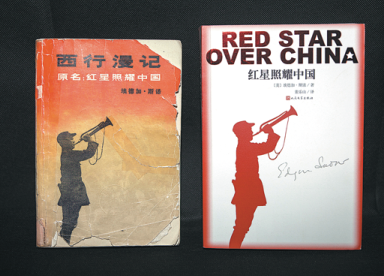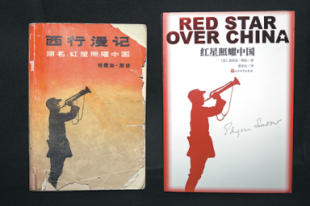Edgar Snow's 'Red Star' shines on


Red Star over China has become a must-read for people keen to learn about the CPC's revolutionary past. And its Chinese editions proliferated over time.
One of the latest editions sold 3 million copies in just over a year since its release. The Ministry of Education has also suggested the book be compulsory reading for middle school students.
Douban, a popular online review site, has about 10 Chinese editions of Red Star Over China and they all score ratings of more than 8 out of 10. Snow discovered that communism genuinely stirred many young Chinese. Soldiers of the Red Army were described as "unbeatable", demonstrating "sheer dogged endurance" and having "the ability to stand hardship without complaint". The epic Long March was a perfect example of this.
Snow wrote about how the Red Army, whose members were mostly poor peasants, trekked over mountains, crossed rivers, while surviving on little food and dodging their Kuomintang pursuers on their journey to reach Yan'an.
"This had a big impact on Western readers," says Wu Shulin, vice-executive director of the Publishers Association of China. "The Red Army's resilience and ability to overcome hardships won them a lot of admiration."
And the communists won support from the masses who suffered during the Kuomintang regime.
The CPC introduced extremely popular policies in the Red zone: they eradicated opium, child slavery and compulsory marriage, while promoting mass education at the same time.
Their honest, upright and down-to-earth behavior was in stark contrast to the arrogance, arbitrariness and corruption displayed by the Kuomintang, and helped them gain mass appeal.
The Red Army's growing number of new recruits were often described as the "poor man's army".
At the end of his book, Snow wrote that the Communist revolution would "eventually win".
Today's China is a world apart from Bao'an in the 1930s. Yet the CPC carries on its traditions.
The Chinese leadership has called on fellow comrades to "remain true to our original aspiration", and to "never forget why you started, and you can accomplish your mission".
Over the past five years, many wide and far-reaching campaigns to rid the Party of corruption and undesirable conduct have been launched, leading to broad improvements in the political system.
Snow died in Switzerland in 1972. Some of his ashes were buried at Peking University.
Inscribed on the tombstone are words in both Chinese and English that read: "Edgar Snow, American friend of the Chinese people."





































